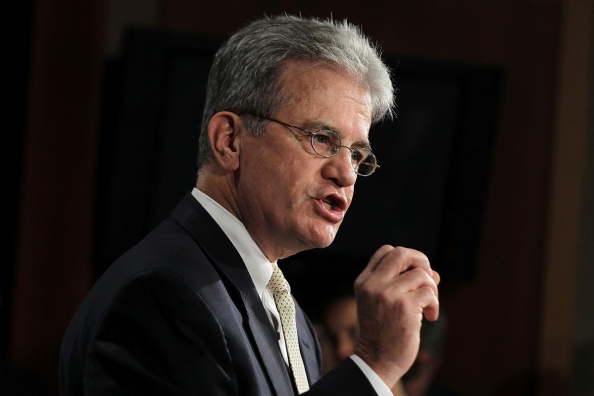Oklahoma Republican Tom Coburn is known around the Senate as "Dr. No" for his propensity to hold up key legislation, single-handedly, because it contains something not to his liking (or sometimes because he's upset about something else entirely.) On Veterans Day in 2009, he shocked even his GOP colleagues by blocking veterans' benefits because he wanted their cost to be offset. Because of a Senate rule requiring unanimity for certain votes, he alone has been able to block votes on wilderness protections, health care provisions, and disarmament in Uganda.

Now Dr. No has his sights set on bicycle and pedestrian funding.
As calls for a "clean" extension to SAFETEA-LU poured in, Coburn made it clear last week he won't get with the program. His spokesperson announced that Coburn would try to block the extension if Transportation Enhancements weren't removed from the bill.
About two percent of the federal transportation budget goes to TE, and of that, 57 percent goes to bike/ped projects, with the rest funding streetscaping, historic preservation and other programs.
The GOP rallying cry against the miniscule amount of money for bicycle and pedestrian improvements is metastasizing. Earlier we reported that House Majority Leader Eric Cantor was urging that dedicated funding for Transportation Enhancements be eliminated. And today, Cantor, along with House Speaker John Boehner, sent a letter to President Obama with the same demand:
We are not opposed to initiatives to repair and improve infrastructure, and believe there are reforms that can be implemented that would improve their effectiveness in a manner that supports economic growth. Current law requires that states set-aside 10 percent of their surface transportation funds for transportation enhancements, which must be used for items such as establishment of transportation museums, education activities for pedestrians and bicyclists, acquisition of scenic easements, historic preservation, operation of historic transportation facilities, etc. While many of the initiatives funded by this mandatory set-aside may be worthy projects, eliminating this required set-aside would allow states to devote more money to the types of infrastructure programs you are advocating without adding to the deficit. We believe such a reform would be consistent with your statement last week that we should “reform the way transportation money is invested, to eliminate waste, to give states more control over the projects that are right for them.”
Boehner and Cantor also hoped to find common ground with the president on speeding up reviews of infrastructure projects.
It's hard to underestimate the damage that this Republican movement against TE can do. It will certainly complicate the passage of an extension of SAFETEA-LU, meaning that Sen. Coburn, and possibly other members of Congress, are declaring their willingness to throw the entire transportation industry, as well as commuters, under the bus while they quibble about the pennies spent on bike paths. According to the White House, if the bill is delayed just 10 days, the country would lose over $1 billion in transportation funding — “money we can never get back.”
How many senators will risk this kind of fallout by standing up for bike/ped funding?
Extensions used to be employed in order to buy more time so that lawmakers could debate policy changes. Now, policy changes are demanded in order to just buy more time. It's in this frenzied, time-strapped atmosphere that Congress will decide over the next two weeks whether or not to kill federal support for active transportation programs.





